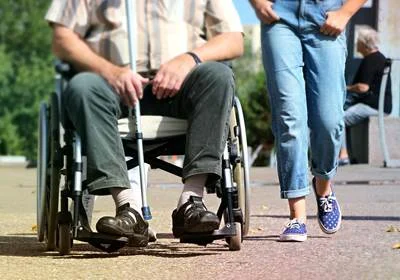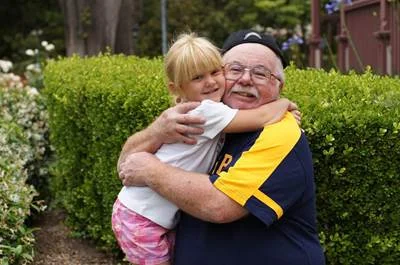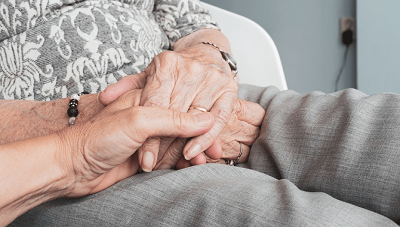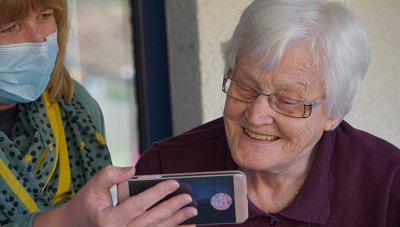How to Help a Loved One Adjust to Life in a Wheelchair

How to Help a Loved One Adjust to Life in a Wheelchair November 17, 2023 It can be a traumatic experience for anyone to lose their mobility and adjust to life in a wheelchair. The prospect of spending life in a wheelchair can fill a lot of people with fear. It may be necessary to make adjustments around the home, change travel plans, or having difficulty getting the person dressed.Unfortunately, many shopping malls, airports, parks, and recreation facilities are not designed with wheelchairs in mind. So, how can you help a loved one adjust to life in a wheelchair? Adjustments at home One of the first things to help with is to arrange for the necessary adjustments around the home to be made. This means making sure that doors are wide enough, door handles are easy to open, workspace in the kitchen is lowered and the appropriate aids are installed in the bathroom. Usually, before you buy a wheelchair, it’s best to make these arrangements.You may also want to think about the type of flooring. It can be difficult to move in a wheelchair if there are thick carpets in the home. Usually, hardwood or tile flooring is easier. You will probably have to arrange for better access to the home by the use of ramps. Give practical support It is also important to reassure your loved one of practical support that you can provide. For example, it can put someone’s mind at ease just to know that groceries will be delivered regularly, they will be taken out for trips if practical, and you will be there to speak to them. Explore new technology There are also ways that you can help a person adjust to life in a wheelchair by looking at new technology. For example, there are digital companions like the Amazon Echo device that responds to voice commands. This can help a person with reduced mobility turn lights on and off, order items on the internet, or play music. You could also help a loved one confined to a wheelchair use video call apps like Skype or Facebook. These can be great tools that help connect a person with limited mobility to family, friends, or support groups. Even though it can be challenging, there are many practical ways that you can help a loved one adjust to life in a wheelchair. Product Category Years
Beware of the most infectious areas of your home

Beware of the Most Infectious Areas of Your Home November 17, 2023 Knowing where the most potentially infectious areas is vital if you are caring for a loved one at home. Seniors and people with long-term illnesses are prone to infection due to having a weakened immune system. Therefore, it is essential to keep bathrooms, kitchen countertops, trash cans, and light switches free from contamination and germs. Unfortunately, a home can be full of bacteria and germs. However, you can take steps to minimize the risk of unnecessary infection. According to the CDC, the best way to protect yourself and your family from becoming sick is to wash your hands. This can help to reduce the risk of respiratory or gastrointestinal infections. This article lists some of the most infectious areas of your home and how you can keep them germ-free. The floor around your toilet The toilet area is a magnet for germs, which means you should clean it frequently. Therefore, it’s crucial to disinfect this area regularly. Depending on its use, it may be good to use a bleach-based solution to clean the floor around the toilet daily. You can also keep antibacterial wipes on hand for quick cleanups. The kitchen and bathroom sinks Sinks can harbor bacteria because drains provide the ideal environment for bacteria to thrive. In addition, washing contaminated items in sinks can leave a bacteria-filled residue. Therefore, you should wipe down sinks with an antibacterial solution. There are other hazards near bathroom and kitchen sinks where nasty germs can lurk. Here are just a few: Dirty washcloths Kitchen sponges Toothbrushes Towels After use, it’s vital to rinse cloths in hot soapy water and leave them to air-dry. Also, always clean sponges and scrubbing pads thoroughly that were used to wash chopping boards where raw meat and poultry were prepared. In addition, rinse toothbrushes after use and never keep a damp toothbrush in an enclosed holder. Regarding towels, avoid sharing towels between family members. Light switches and doorknobs Surfaces that several people frequently touch can become breeding grounds for germs. Therefore, it’s crucial to use a disinfectant spray or wipes to keep doorknobs and light switches free from germs. If possible, choose a natural disinfectant cleaner because it is generally not as harsh as chemical products, and it’s better for the environment. The remote control, phone, and computer keyboard Frequently touched areas are prime breeding grounds for bacteria, and your remote control is no exception. Make sure you wipe it down with a disinfectant wipe or use a cotton swab dipped in alcohol to disinfect the surface.Similarly, computer keyboards and phones are other places prone to collecting germs. So, it’s good to be in the habit of cleaning any regularly handled items with a suitable disinfectant. In conclusion One of the most important precautions to prevent spreading bacteria and germs is to wash your hands frequently with soap and water. In addition, be careful of shared surfaces and disinfect surfaces often. This way, you can minimize the risk of spreading germs throughout the home. Product Category Years
How to Care for a Loved One with Covid-19

How to Care for a Loved One with Covid-19 May 16, 2024 As the coronavirus pandemic grips the country, many people face the reality of caring for someone who has COVID-19. Most people—including older ones—show mild virus symptoms and can recover at home. However, with social distancing, stay-at-home orders, and the threat of spreading the virus, it’s challenging to care for someone who’s sick with the virus.How can you care for a loved one who has COVID-19? How can you protect yourself from catching this nasty virus?This article answers questions about providing support to someone who is sheltering at home due to the coronavirus. Know the COVID-19 Signs It’s crucial to know the early signs of coronavirus. And, here is the challenging part—you can carry the infection for up to two weeks without showing any symptoms. What are the first symptoms to look out for? According to the Centers for Disease Control and Prevention (CDC), the initial COVID-19 infection signs are as follows: Fever or chills A cough that won’t go away Difficulty breathing Muscle aches Loss of taste or smell If you are looking after a COVID-19 patient in a non-healthcare setting, it’s vital to monitor the person’s health. The CDC says that you should seek emergency help if the patient’s condition worsens. Some warning signs to look out for are: Trouble breathing Persistent pain in the chest Inability to stay awake or wake up Persistent fever over 100.4°F How to Care for Someone Who Has COVID-19 How can you make sure that a person with COVID-19 gets the best care at home? How can you prevent the spread of the virus to yourself and others? 1. Wear a face covering When caring for a person with COVID-19, they and you must wear appropriate face coverings. According to the latest research on the spread of coronavirus, face masks can help stop the spread of the virus. 2. Disinfect surfaces and wash hands regularly The coronavirus can linger for days on hard surfaces. So, you must disinfect high-touch surfaces regularly. This includes light switches, doorknobs, toilets, faucets, and sinks. You should also wash your hands frequently and avoid touching your mouth, nose, or eyes. 3. Choose one caregiver To avoid spreading the virus and putting others at risk, try to arrange for only one caregiver. This person should also limit their contact with others during the 14-day when a person is sick. It is also crucial that the caregiver is not a high-risk person—someone over 60 or a person who has diabetes, heart disease, or asthma. 4. Provide practical support While the patient is recovering from COVID-19, they need plenty of practical support. The majority of people recover successfully from coronavirus within two weeks. But during this time, it’s vital to make sure they drink plenty of fluids and use over-the-counter medicine for pain or fever. 5. Practice social distancing as much as possible Staying a distance of six feet from an infected person is one of the best ways to prevent the spread of COVID-19. Limit contact with the patient as much as possible and use separate bedrooms and bathrooms if possible. You should also avoid sharing any personal items while the person is recovering at home from COIVD-19. Product Category Years
Helpful Tips to Avoid Caregiver Burnout

Helpful Tips to Avoid Caregiver Burnout May 9, 2024 Caregiver burnout is common among people who care for a chronically ill person. Burnout can leave caregivers feeling exhausted, stressed, anxious, and depressed. This is because they’re doing too much work without enough support. To compound the issue, feelings of guilt can affect you when spending time on yourself instead of taking care of your loved one.Before looking at ways to prevent feeling overwhelmed and mentally exhausted if you’re caring 24/7 for someone, it’s vital to recognize the symptoms of caregiver burnout. Caregiver Burnout Symptoms Some symptoms of caregiver burnout include the following: Overwhelming feelings of being stressed out. Withdrawing from family and friends and family. Losing interest in things you once enjoyed. Feeling down and helpless. Physical, emotional, and mental exhaustion. A change in sleep patterns. 6 Steps to Avoid Caregiver Burnout If you are caring for someone, it’s vital to know your limits and potential for burnout. Additionally, having a good support network can also help you talk about your feelings. Here are some helpful tips on preventing burnout if you’re caring for a loved one. Set realistic goals Having realistic goals for yourself and the person in your care can help avoid burnout. It’s not reasonable to think that you can do everything yourself. So, you may need to turn to others for help. Additionally, you could seek support from local organizations or support groups.With progressive diseases, there may come a time when the patient requires professional nursing services or alternative assisted living arrangements. Know your limits Each person has their limits, and the best way to help someone is to recognize what you can and cannot do. For example, like everyone else, you have the potential for burnout. Therefore, limit what you do when you feel it’s getting too much. Additionally, it’s vital to limit contact with negative people who destroy your mood. Establish a support network Avoid thinking that you will burden others if you talk about your feelings and situation. Instead, look for trusted friends, neighbors, coworkers, and family members to whom you can open up. Very often, talking about the issues you face helps to relieve stress. It’s also a signal to others to come to your aid. Take time out for yourself every day Never forget to take time out for yourself every day. Of course, in a stressful environment, this may be challenging. However, taking 15 to 30 minutes to do something you enjoy can help you regain your emotional strength. Of course, just like other people, you also deserve good sleep, proper nutrition, and to enjoy activities. Practice being forgiving and grateful Unfortunately, perfect caregivers don’t exist. And, perfectionism and blaming yourself for mistakes can contribute to caregiver burnout. So, focusing on self-forgiveness and forgiving those who care for us is incredibly healing. Gratitude helps us appreciate life more. Look after your health Your body needs regular care, and you shouldn’t neglect yourself while taking care of someone else. Instead, look after your health so you can care better for others. Here are some helpful tips on looking after your health: Exercise is a great way to relieve stress and boost your mood. Aim for a minimum of 30 mins per day. Relaxation techniques are an excellent way to reduce stress and increase feelings of joy and wellbeing. Eat well. Nourish yourself with fruits, veggies, proteins, and healthy fats. Try to get at least eight hours of sleep every night. Product Category Years
Caring for Someone with Alzheimer’s Disease

Caring for Someone with Alzheimer’s Disease May 2, 2024 Caring for someone with Alzheimer’s disease can be one of the most difficult challenges that a caregiver can face. It is a struggle to watch the disease slowly progress to the point where communication with your loved one is difficult or impossible. If you are providing daily care for a senior with dementia, then you have additional challenges to face.How can you provide the best care if you are caring for an Alzheimer’s patient? Here are some helpful tips for providing the best quality care. 3 Ways to Care for Someone with Alzheimer’s Disease Although every situation is different, there are 3 basic things you have to remember to provide loving care to an Alzheimer suffer. Communication Communicating with someone who has Alzheimer’s can be very difficult. It’s important to remember that they cannot control what is happening. It also may be difficult for them to express themselves properly. Therefore, caregivers need to learn effective communication methods tailored to the patient.It’s also important not to take what they say personally or try to correct them. For many Alzheimer’s sufferers, they only live in the present and making them feel relaxed and comfortable is very important. For example, if they point to pass the bread but say pass the cookies, avoid correcting them but pass what they are pointing at. This will help to avoid frustration and anger. Patience Being patient while caring for a loved senior suffering from dementia is also very important. They may keep repeating themselves, forget what they just asked, or accuse you of something you haven’t done. Your goal is to make the person relaxed at the present. So, try to answer in such a way that they feel at ease.Patience may also be required if the person become angry of physical. This may be the only way that the person can express frustration at not being able to communicate their true needs and feelings. Use body language Body language and tone of voice is very important when caring for an elderly person with Alzheimer’s. Some ways to do this is to keep good eye contact when speaking, gently touch their arm or hand when speaking with them, and try not to vent frustration in your voice when speaking.Also try to avoid negative body language like crossing arms and raising your voice. These are subtle ways that you can help care for the Alzheimer’s patient with love, care, and consideration. Product Category Years
How to Boost a Seniors Immune System Naturally

How to Boost a Seniors Immune System Naturally April 25, 2024 Having a strong immune system is important to keep a senior healthy and reduce the risk of serious infection. Even if an elderly person does have a health issue, a strong immune system will boost the chances of making a speedy recovery. Improving the immunity of an aging person is also important because the aging process weakens the body’s immune response.In this article, you will find out various ways of boosting the immune system if you have to care for a person who is over 60. Many of these immune-boosting strategies are virtually cost-free and can have a beneficial effect on general health. Well-balanced diet To be healthy and have a strong immune system, it’s important to eat a healthy diet that is rich in nutrients. It’s important to try and get as many vitamins and nutrients as possible from dietary sources. If this is not possible, then multivitamins can help to boost immunity.Because an older person is generally less active, it’s also important to stick to a low-sugar, low-fat diet. Age-appropriate exercise Exercising is not just good for your cardio health and keeping excess weight down, regular exercise also helps to boost the immune system.A study published in the journal Aging Cell found that being physically active in old age can help your body respond better to vaccines and fight against flu and infections.[1] So, it’s important to help a senior be as active as they physically can be to give their immunity a boost. Wash hands Many infections like the common cold and flu are transmitted by touching infected objects. Even carers who have an upper respiratory infection can unwittingly pass on germs to seniors they are looking after. So, it’s good to wash hands regularly and avoid unnecessarily touching eyes, mouth, ears, or nose. Reduce stress Stress can affect the immune system of any person and, therefore, it’s important to help a senior cope with stress. Stress has been linked to making a person more susceptible to viruses and infections. Sometimes, listening and offering reassuring comfort can help to reduce stress. Also, making sure that your elderly parent has a good social network of friends can help to reduce stress and boost immunity. Sleep One of the most important ways to give your immune system a needed boost is to get enough sleep. Getting adequate amounts of sleep can help a senior fight infections quicker and make the body respond better to vaccines. Source: Aging Cell. 2018 April;17(2):e12750. Product Category Years
How to Communicate with Seniors – Top Tips

How to Communicate with Seniors – Top Tips April 18, 2024 The aging process brings many challenges when it comes to communication. Seniors may suffer from hearing loss, their speech can become indistinct, and confusion can affect their thinking process. Knowing the best way to communicate with seniors can help to turn a frustrating situation into an enjoyable experience. In fact, both the elderly person and the caregiver can benefit much more from a meaningful conversation.What can make it easier to communicate with and care for an elderly relative that you have to care for? Here are some top tips on successfully communicating with seniors. Speak Clearly with Enough Volume First and foremost, it’s important to speak clearly so that you are easily understood. Sometimes seniors feel embarrassed if they have not heard you and may not ask to repeat something. So, look for clues that you are being understood.However, it’s important to avoid speaking in such a way that makes them feel embarrassed. Just make sure that you speak with enough volume to be heard and enunciate properly. Short simple sentences also make communicating easier. Use Good Eye Contact It’s important to keep good visual eye contact when communicating with those in their senior years. Our eyes also communicate non-verbal messages and good eye contact shows a caring attitude. If your loved one is in a wheelchair, try and be on the same level by either sitting beside them or crouching down. Be Aware of Background Noise Noises in the background like a TV or radio can make communication more difficult. If the elderly relative wears a hearing aid, he or she may hear these noises louder than you do. Turn down or switch off the radio or TV or move to another room that is quieter. Listen The art of successful communication is also knowing how to be a good listener. Seniors sometimes like to reminisce and even though you may have heard the story before, continue to listen and show interest. Some seniors who have Alzheimer’s disease or have had a stroke may have vivid memories about their childhood, but can’t remember what they had for lunch yesterday.Sometimes, just taking out a few old photographs is a great way of communicating with seniors and let them talk about their “good old times.”Communicating with seniors can be a challenge, but with a little patience and speaking clearly, you can successfully communicate with loved ones in their older years. Product Category Years
Tips on Caring for Someone with Dementia

Tips on Caring for Someone with Dementia April 11, 2024 Caring for a loved one with dementia can be a stressful and challenging time. But with the proper care and support, it can be a rewarding experience.Unfortunately, dementia or Alzheimer’s disease can affect a person in so many ways. Dementia can lead to loss of memory and reasoning. A person who has dementia can experience behavioral changes and undergo physical decline. However, the way dementia affects an individual varies from person to person.This article looks at some ways to support and assist a loved one who had dementia. You’ll also find helpful tips on what to avoid for providing the needed care. What is Dementia? Dementia refers to a progressive loss of brain function due to certain diseases. According to the Centers for Disease Control and Prevention (CDC), dementia is a group of conditions that affect a person’s thinking, memory, communication, and reasoning abilities.Signs of dementia include getting lost, forgetting the names of close people, mood changes, or general confusion. The Best Ways to Care for Someone with Dementia Here are some handy tips on how to provide the best care for a person living with dementia. 1. Help with everyday tasks As a person’s symptoms worsen, they may start feeling stressed, anxious, or even frightened. As a result, it may be difficult to remember things or follow conversations. Therefore, it can be helpful to have memory aids in the house. You also may need to slow down in conversation and use more straightforward language. 2. Help maintain a healthy diet Enjoying a healthy diet and getting enough fluids is crucial for anyone with dementia. A poor diet or not getting enough to drink can increase the risk of infection and illness. To help make mealtimes less stressful, try serving food in smaller portions or provide finger food.It’s also vital to ensure they have regular dental checkups. This helps ensure that poor-fitting dentures are not the reason for refusing to eat or getting frustrated at mealtimes. 3. Dealing with a loss of communication It is distressing to see that a dementia patient has difficulty expressing themselves. So, it may be necessary to have patience when communicating. In some cases, using gestures can help them to express themselves.Also, try asking direct questions rather than general ones. For example, for mealtimes, ask “Would you like lasagna today?” rather than “What would you like to eat?” 4. Try to stick to a familiar routine If possible, create routines to cope with day-to-day life. For example, it’s a good idea to stick to regular mealtimes and bedtime routines. This helps provide stability. But you may also have to be flexible if some routines are clearly causing distress. What to Avoid When Caring for Someone with Dementia If you are looking after a loved one with dementia, there are also some things you shouldn’t do. So here a few things to avoid in dementia care to respect their dignity: Don’t speak to them like a child. Avoid arguing with them if they are confused or forget things. Try not to bring up the past. Dementia suffers live in the moment, and they may forget what happened yesterday or even a few hours ago. Stay connected emotionally. Product Category Years
Recognizing the Signs of Depression in Older Adults

Recognizing the Signs of Depression in Older Adults April 4, 2024 Recognizing if an older adult is depressed can be challenging. This is because depression affects older adults differently from younger adults. Many seniors who suffer from depression don’t realize they’re depressed until someone points out their behavior patterns. But if you are providing care for an older person, some tell-tale signs could help them get treatment sooner rather than later.Unfortunately, figures show that up to 20 percent of older adults suffer from depressive symptoms. This can rise to 45 percent if they are in a healthcare facility. And older people who have depression usually struggle with other medical issues or disabilities.How can you recognize the signs of depression in older adults? This article provides some helpful advice on helping an aging loved parent or relative struggling with feelings of helplessness. 4 Signs of Depression in Seniors Let’s look at some tell-tale signs that could indicate an older adult is suffering from depression. It’s good to remember that many of these signs could also be related to other underlying health issues. 1. Changes in personality It’s common for older adults who suffer from depression to have personality changes. This could manifest itself as feeling tired, more irritable, or struggling to pay attention. For example, were they once outgoing and confident but are now more pessimistic and unsure of themselves? Have they started to move or talk slower? These could be signs that they are feeling depressed. 2. Changes in sleeping habits A tell-tale sign of depression is often related to sleep problems. This could be sleeping too late or waking up early. Or you may notice that they are sleeping more often during the daytime. The lack of physical activity could also lead to weight gain. 3. Losing interest An older person with hidden depression may give up on things that were once important. It could be that they have lost their joy in doing fun activities, or they start half-heartedly participating in them. For example, does the person in your care retreat from social interaction and prefer to stay home alone more often? 4. Feelings of worthlessness A typical sign of depression in older people is increased feelings of worthlessness, guilt, hopelessness, or helplessness. Of course, it’s natural for someone with mobility issues or who must rely on someone for personal care to feel this way. But if the feelings continue for several weeks, it may be time to seek professional help.If you’re worried that your loved one may be experiencing depression in their senior years, don’t hesitate to get in touch with a health professional. Depression is a genuine condition that can be successfully treated. Product Category Years
How to Help Seniors Age with Dignity

How to Help Seniors Age with Dignity March 28, 2024 Aging brings multiple challenges for older persons as they deal with changing circumstances. Feeling restricted with what they can do physically can be difficult. This could mean relying on walking supports, spending more time indoors, or giving up the driving license. All these changes can cause a senior loved one to feel sad, frustrated, and even angry.Caregivers also have challenges. Apart from the emotional pain of seeing a loved one age, there are challenges in providing care—physically, emotionally, and mentally. And helping a senior person to age with dignity can help to make giving care easier.Thankfully, several ways can help a senior person grow old with dignity. Here are four ways that you can assist an aging parent to keep their self-respect and dignity intact during difficult circumstances. 1. Be supportive It’s essential to as supportive as possible. This requires being patient, not being judgmental, or speaking down to them. Rather than focusing on what they can’t do, it’s good to emphasize the positives of any situation. At the same time, it’s essential to arrange for care so they can be as independent as possible. 2. Respect their choices As a primary caregiver, it can be tempting to start making choices for an aging parent. However, making decisions for them can affect their feelings of self-worth. Therefore, it’s always good to involve them in decision-making processes. Suppose they decide on something that you disagree with? In this case, it’s crucial to speak respectfully and not dismiss their decisions without a valid reason. 3. Patience help seniors age with dignity Being patient is one of the most challenging aspects of caregiving. Depending on their condition, it may take longer for them to communicate. Additionally, seniors can be set in their ways and be resistant to change. However, being patient can help keep their dignity and pride intact.It can help to put yourself in their position. Imagine having someone else dictate what you should do. Or how you would feel if you had some freedoms taken from you. Showing some empathy can help be more patient. 4. Ensure the home is safe As a person ages, cognitive ability and mobility decline. Therefore, it’s vital to ensure that the home is a safe environment. So, it’s a good idea to install safety devices to ensure they can safely get around the house. You may also have to arrange for someone to care for maintenance, cleaning, and shopping.Helping seniors age with dignity is vitally important. With some patience and installing assistive devices, you can care for an older loved one without damaging their dignity. Product Category Years







